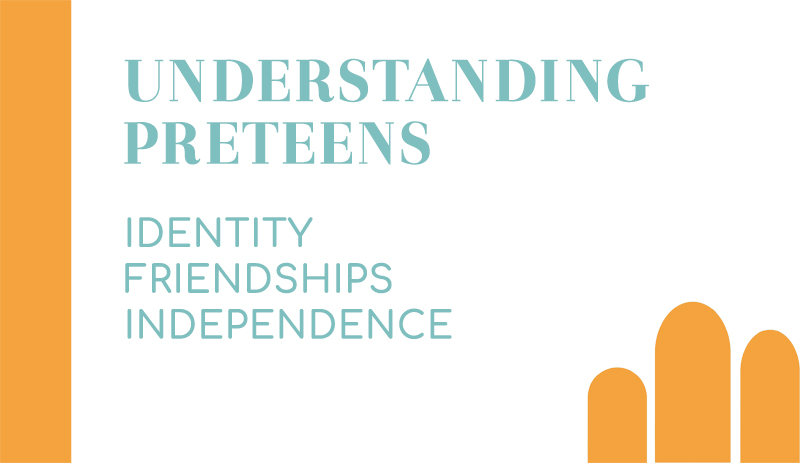UNDERSTANDING PRETEENS

Written by MS Broudy & Nick Diliberto
The one word that sums up the preteen years is transition.
One of the many changes 10-12-year-olds undergo is in the area of friendships. Preteens begin to move away from family relationships and gravitate more towards peers.
Developmentally, two significant events are occurring: independence and identity formation.
Add to that close proximity to friends for long periods of time, and there is the potential for preteens to be heavily influenced by their peers.
This provides a church leader with an opportunity to foster healthy peer-to-peer relationships within a preteen ministry. These relationships are the foundation for spiritual growth and offer other development needs crucial to students’ overall well being.
In this blog post…
MS Broudy – a psychologist for 20 years, writer, and consultant – joins us. He has a Ph.D. in clinical psychology and a master’s degree in social psychology.
MS breaks down the developmental process preteens are undergoing when it comes to friendships, then I share how those concepts apply to a preteen ministry.
I think you’ll find this blog post very useful, and you’ll want to share it with volunteers.
Nick Diliberto
Looking for preteen curriculum? Check out the…
One Year Preteen Curriculum – Volume 1 and 2 are now available. Get one year of preteen ministry curriculum designed to help 4th-6th graders explore their faith and wholeheartedly follow Jesus

UNDERSTANDING PRETEENS: IDENTITY, FRIENDSHIPS & INDEPENDENCE
First, let’s dive into the three reasons peer friendships are such a high priority for preteens:
INDEPENDENCE
Being more independent can be scary for a 10-year-old. They can’t turn to their parents because they are trying to be less dependent on them. Instead, friends are relied upon for acceptance and support. Also, friends give preteens a barrier against negative peer relationships, such as bullying.
IDENTITY FORMATION
Identity formation is not predetermined. A lot of it is done through trial and error and observational learning. While parents, teachers, church leaders, coaches, etc. can be a valuable resource, preteens are going to gravitate toward peers naturally. By default, they’re going to rely on friends for acceptance and a sense of belonging.
(A quick side note on identity. I’ve found it helpful to reinforce the idea of finding your identity in Christ regularly. Do a series on it once a year and repeatedly talk about it in small groups and one on one with students.)
PROXIMITY
Tweens are around their friends more than ever before. Besides school, they are spending more time on extracurricular activities and on social media interacting with friends. During the week, tweens may spend upwards of ten hours per day around their peers. In short, friends are their world.
So, what does this all mean for a ministry leader? You have the opportunity to create community for the preteens in your ministry.
A place where they:
- Grow in their relationship with God
- Know others and are known
- Accept others and are accepted
- Celebrate others and are celebrated
- Pray for others and are prayed for
Where else can preteens go to find a place like that? Nowhere. It’s one of the main reasons the church exists, and it’s foundational to reaching preteens.
Furthermore, a positive peer group has the following benefits:
POSITIVE INFLUENCES
Healthy friendships influence positive behavior. If preteens are surrounding by others their age who love God, serve others, are encouraging, and make wise choices…they’re going to be influenced to do the same.
SOCIAL SKILLS
Although some students are naturally social, learning how to make friends generally takes practice. There is no better way to gain social skills than spend time with friends and trying out different approaches. Think of it as training for adult friendships.
SUPPORT
Just as in adulthood, friends can provide a great sense of support. The feeling of acceptance from a peer group provides a sense of encouragement that students are looking for.
INTIMACY
Up until the tween years, almost all intimate relationships are between family members or caretakers. Friendships acquired during the ages of 10-12 are a preteen’s first taste of intimacy between peers. Learning to form and maintain trust in a friend is an essential developmental process.
Bottom Line: Your job as a ministry leader or volunteer is to create an environment where preteens can find a community of peers who love and follow Jesus. Not only is it key to spiritual formation, but it meets other development needs crucial to students overall well being.
Here are some ideas on how to create that kind of environment in your ministry:
- Intentionally allow time for students to build relationships during weekend/midweek services.
- Separate preteens from younger and older students during weekend/midweek services.
- Host fun relationship building preteen events outside of weekend or midweek services
- Offer small groups for preteens during the week.
- Teach a series on: positive and negative peer pressure; how to be a good friend and how to choose friends wisely; how to make good decisions when with friends; or finding your identity in Christ rather than others.
- Regularly talk with students in small groups about the problems they’re facing with friends.
The preteen years can be difficult, but being a part of a community of peers who are all doing their best to love God and serve others can make the transition years much smoother.
[End Blog Post]
Looking for preteen curriculum? Check out the…
One Year Preteen Curriculum – Volume 1 and 2 are now available. Get one year of preteen ministry curriculum designed to help 4th-6th graders explore their faith and wholeheartedly follow Jesus

Written by MS Broudy & Nick Diliberto.
MS Broudy is a psychologist, writer, and consultant. He has obtained a Ph.D. in clinical psychology and a master’s degree in social psychology. He has spent over 20 years providing therapy and assessment services for a diverse set of clients. MS specializes in writing about mental health, parenting, and wellness. He has his own blog, mentalspokes.com, where he writes about psychological issues that he finds interesting.
Nick Diliberto is the Founder of Ministry to Youth.
